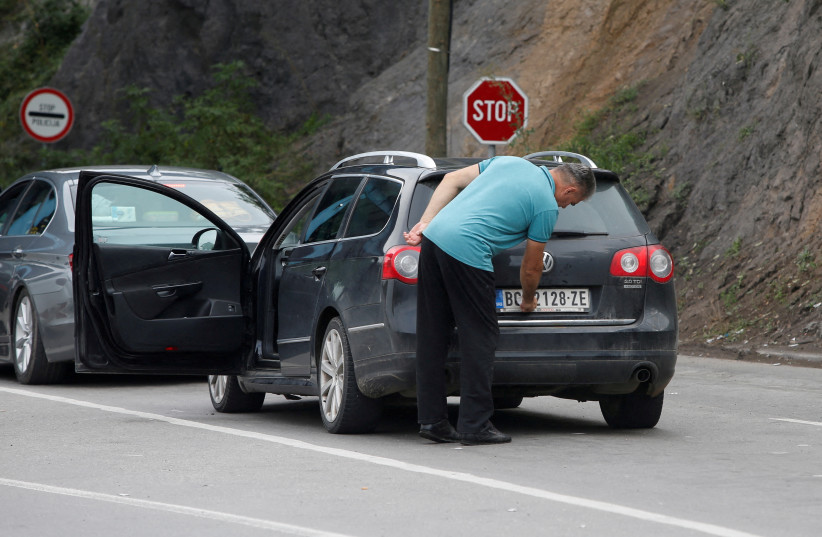Serbia's military has increased its combat readiness after drones were reportedly spotted over the country's airspace in recent days, Serbian state media reported on Wednesday.
Serbian President Aleksandar Vučić ordered that any "enemy drones" spotted in Serbian airspace be destroyed immediately, instructing the launch of the country's MiG-29 fighter jets in order to monitor for any drones, according to Serbian state media RTS.
Serbian Defense Minister Miloš Vučević stated that he could not say who the drones belonged to, but claimed that they came from the territory of Kosovo, according to RTS. The defense minister claimed that drones had entered Serbia multiple times in the past three days and that the MiG-29 jets were not launched because of the drones but instead to conduct "regular policing patrols."
Vučević warned that the Serbian military could use machine guns, helicopters, cannons and other means to "respond to these challenges."
Serbian Prime Minister Ana Brnabić claimed that the drones were spotted filming a Serbian military site in the Ground Safety Zone between Kosovo and Serbia and two barracks belonging to the Serbian military. The prime minister claimed that "many foreign entities" want to know what Serbia's plans are in relation to "ensuring the safety of Serbs in Kosovo and Metohija."
"What we will try to do as before is to preserve the peace, to preserve security, to try to have a positive influence on stability, although at the moment it is extremely difficult because on the other side we have people who do not think rationally and who will use everything that can be used to further destabilize the situation and threaten security with their unilateral moves," said Brnabić.

Serbia does not recognize Kosovo's independence, declared in 2008.
Recent tensions between Kosovo and Serbia
In July, air raid sirens sounded in northern Kosovo as Kosovo officials prepared to require Serbians visiting Kosovo to replace their Serbian passports with a temporary ID while in the country and to require Serbian license plates in the country to be replaced with Kosovar license plates.
Roadblocks were set up by Serbs in northern Kosovo in protest against the decision and after negotiations, the license plate replacement was delayed until last week.
Last week, Kosovo Prime Minister Albin Kurti announced that the requirement for Serbian license plates to be replaced with Kosovo plates would be implemented in three phases, starting on Tuesday. Until November 21, those driving with Serbian plates would receive a warning. From November 21 until January 21, 2023, those using Serbian plates will receive a fine. From January 21 to April 21, provisional plates will be placed on vehicles with Serbian plates. After April 21, the circulation of vehicles with Serbian plates will be illegal.
On Tuesday, RTS reported that Kosovo police had issued over 50 warnings to drivers using Serbian license plates.
The defense minister of Serbia warned that the insistence to implement the license plate replacement could "jeopardize security" and that Serbia would need to react.
In September, NATO brought in reserve troops assigned to its KFOR peacekeeping mission to Kosovo for training, one of the mission commanders said, according to Reuters. Around 3,700 NATO peacekeepers are still stationed in the former Serbian province to prevent violence between ethnic Albanians and Serbs.
The mayor of northern Mitrovica, Milan Radojević, told Kosovo state media RTK on Tuesday that "Serbs in the north are not a threat to anyone. We want to live a decent life. From our side, there will be no incidents or problems until the first fine is issued, which according to the warnings may happen after 21 days. But we will see what the reality is on the ground."
The mayor stressed that Serbs are determined not to change their license plates.
Last week, Nabila Massrali, spokeswoman for foreign affairs and security at the European Commission, urged Kosovo to allow a longer transitional period for the license plate replacements. "This has been the consistent advice of Kosovo's closest partners, including the EU and the US It is disappointing to see it has not been followed," said Massrali, according to Radio Free Europe/Radio Liberty.
State Department spokesman Ned Price also urged Kosovo to delay the decision, saying "Kosovo has the right to implement the license plate regime under the Brussels Agreement, but an extension of the timeline is in the interest of making progress on the EU-facilitated dialogue to normalize Kosovo-Serbia relations."
